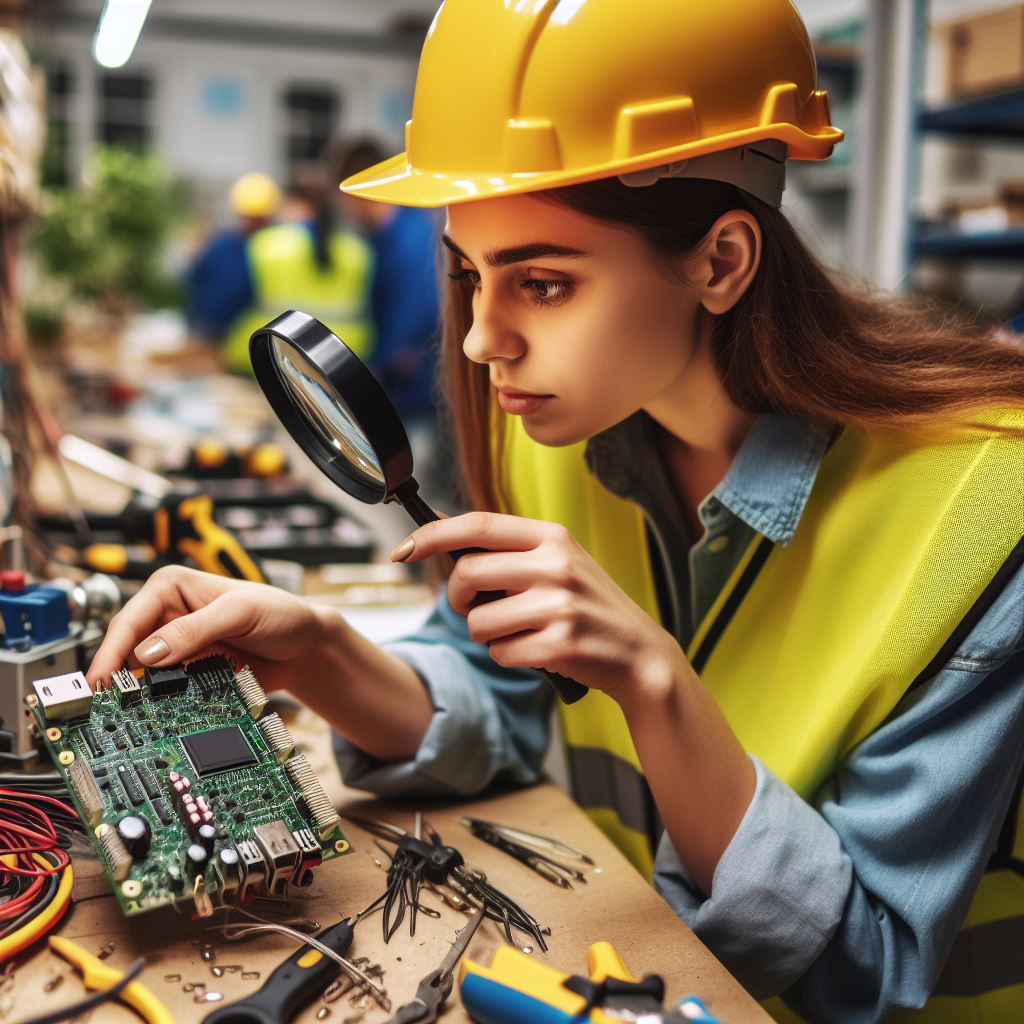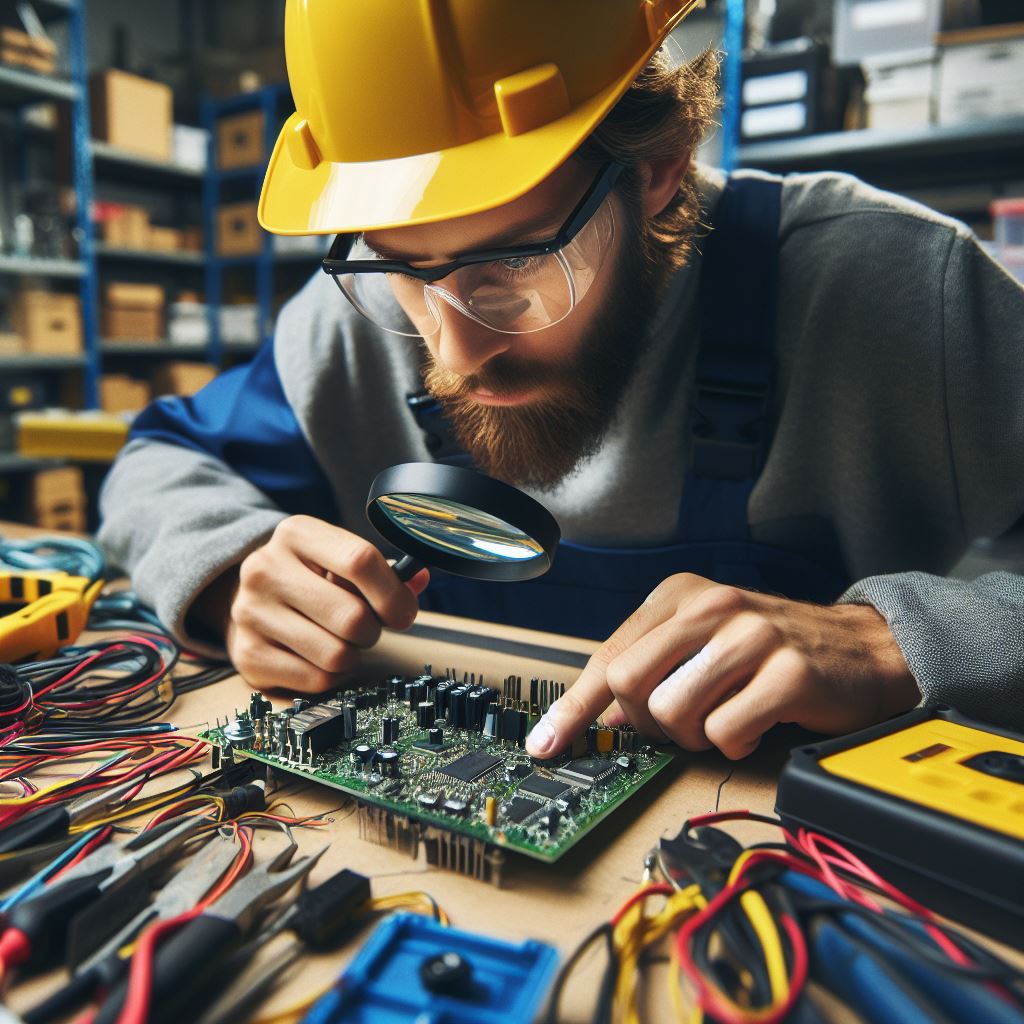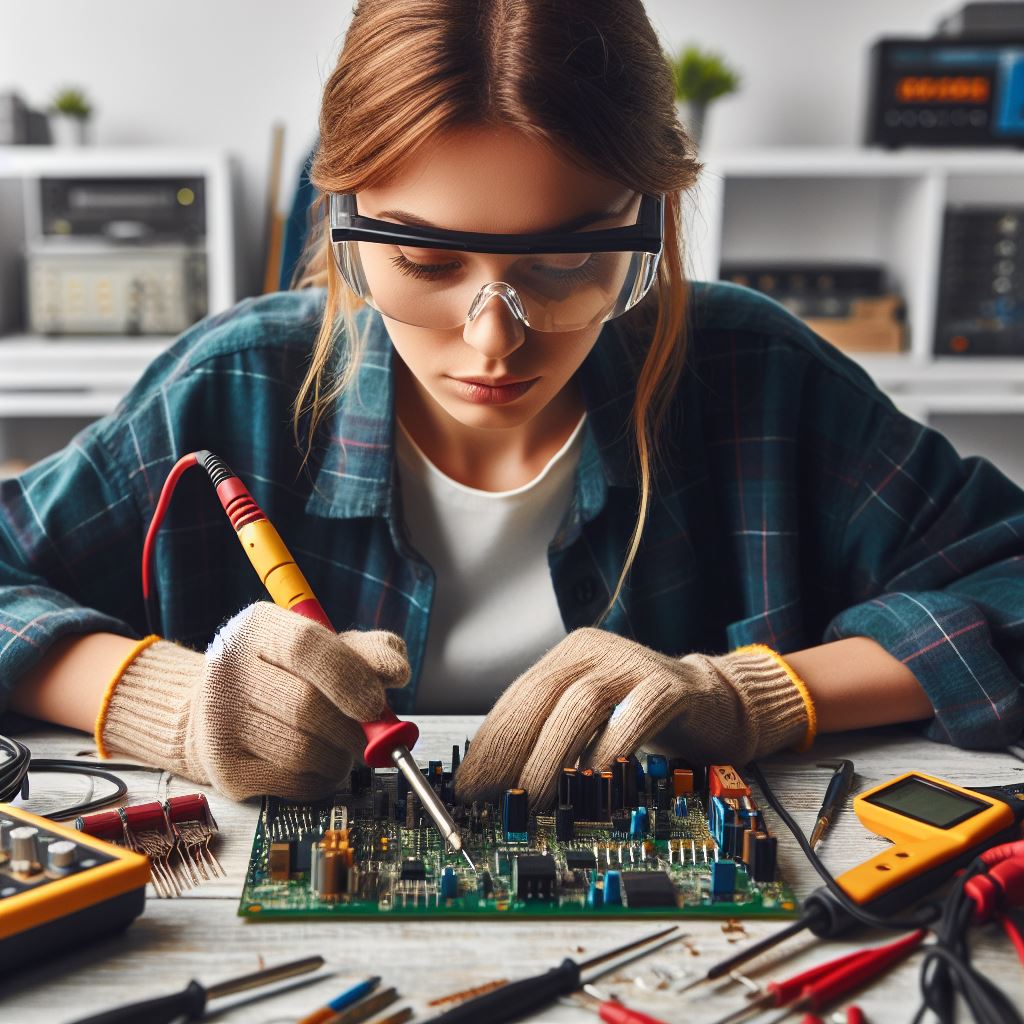Introduction
EE licensing refers to the process of obtaining a license to work as an electrical engineer in Australia.
It is essential for anyone wanting to practice electrical engineering professionally in the country.
This blog section provides a brief explanation of EE licensing, highlights the importance of obtaining it, and gives an overview of what will be covered in the upcoming blog post.
Obtaining an EE license in Australia is crucial for several reasons.
Firstly, it ensures that electrical engineers meet the required standards and possess the necessary skills and knowledge to work safely and effectively.
Additionally, it serves as a regulatory measure to protect public safety and prevent potential hazards caused by inexperienced or unqualified individuals.
In this blog post, we will delve into the step-by-step process of obtaining an EE license in Australia.
We will explore the specific requirements, qualifications, and examinations necessary for licensure.
Additionally, we will discuss the different types of licenses available, such as professional engineer, engineering technologist, and engineering associate licenses.
Furthermore, we will address the benefits of obtaining an EE license, including enhanced career opportunities, professional recognition, and eligibility for government or industry contracts.
We will also cover the ongoing professional development obligations and the importance of staying up-to-date with technological advancements and industry regulations.
By the end of this blog post, readers will have a comprehensive understanding of EE licensing in Australia, its significance, and the necessary steps to obtain and maintain it.
Whether you are a student pursuing a career in electrical engineering or a seasoned professional, this information will prove invaluable in navigating the licensing requirements in Australia.
Stay tuned for the upcoming sections!
Types of EE Licenses in Australia
When it comes to working in the electrical industry in Australia, there are several types of licenses that you need to be aware of.
Each license serves a specific purpose and has its own requirements for obtaining it.
Choosing the right license for your desired career path is crucial to ensure you have the necessary qualifications for your chosen field.
A. Electrical Contractor’s License
- This license allows individuals or businesses to contract electrical work to others.
- Requirements: Completion of an Australian Recognized Trade Certificate, relevant experience, and business management qualifications.
- Importance: Essential for those who want to operate their own electrical contracting business.
B. Electrical Worker’s License
- Also known as a “tradesperson’s license,” it authorizes individuals to perform electrical work.
- Requirements: Completion of an Australian Recognized Trade Certificate or equivalent qualification.
- Importance: Necessary for individuals who want to work as electricians or electrical professionals.
C. Restricted Electrical Worker’s License
- This license limits the type of electrical work that individuals can perform.
- Requirements: Completion of training or assessment that covers specific electrical tasks, such as disconnecting and reconnecting equipment.
- Importance: Allows individuals to legally perform specific electrical tasks within their scope of training.
D. Safety Worker’s License
- Required for people working in high-risk electrical environments or directly with electrical power infrastructure.
- Requirements: Completion of specific electrical safety training programs and assessments.
- Importance: Ensures individuals have the necessary knowledge and skills to work safely in hazardous electrical environments.
E. Insulation Worker’s License
- This license authorizes individuals to perform electrical insulation work.
- Requirements: Completion of specific training and assessment related to electrical insulation.
- Importance: Allows individuals to perform insulation work on electrical equipment, ensuring safety and effectiveness.
F. Machinery Worker’s License
- Allows individuals to perform electrical work on specified types of machinery.
- Requirements: Completion of specific training and assessment related to electrical machinery.
- Importance: Essential for individuals working with electrical machinery to ensure competence and safety.
G. Choosing the Right License
It is crucial to choose the right license for your desired career path in the electrical industry.
By selecting the appropriate license, you can ensure that you meet the necessary qualifications and legal requirements for your specific field of work.
Consider the following factors when choosing the right license:
- Educational Background: Assess your educational qualifications and ensure they align with the requirements for the license.
- Career Goals: Determine what type of electrical work you want to pursue and choose a license that covers that field.
- Experience: Evaluate your relevant work experience and choose a license that acknowledges your skills.
- Personal Circumstances: Consider your personal circumstances, such as the ability to meet licensing requirements.
Remember, obtaining the right license is fundamental to advancing your career in the electrical industry in Australia.
Conduct thorough research, consult with experts, and ensure you meet all the requirements before applying for a license.
Taking the time to choose the correct license will not only enable you to work legally and be recognized in your chosen field but also provide you with better opportunities and job prospects in the electrical industry.
Read: Australian Urban vs Rural Surveying Work
Eligibility Criteria for EE Licensing
A. Educational requirements
- Completion of an approved electrical engineering program is a prerequisite for EE licensing in Australia.
- Applicants must have obtained a degree or diploma from a recognized educational institution.
- The program should cover core topics such as circuit analysis, power systems, electronics, and electromagnetism.
B. Work experience requirements
- Applicants must have a minimum number of years working as an electrical engineer to be eligible for EE licensing.
- The specific requirement may vary depending on the state or territory in which the license is sought.
- Typically, a minimum of 3-5 years of relevant work experience is expected.
C. Skills and competency assessments
- In addition to academic qualifications and work experience, applicants must undergo skills and competency assessments.
- These assessments evaluate the applicant’s technical knowledge, problem-solving skills, and ability to apply engineering principles.
- Assessment methods may include written exams, practical examinations, and interviews conducted by a professional engineering body.
- The purpose of these assessments is to ensure that applicants possess the necessary skills and competencies to practice as electrical engineers.
D. Continuing professional development
- EE licensing in Australia also emphasizes the importance of ongoing professional development.
- License holders are required to participate in continuing education activities to keep their knowledge and skills up to date.
- These activities can include attending seminars, workshops, conferences, or taking additional courses related to electrical engineering.
- By engaging in continuing professional development, engineers can enhance their expertise and stay abreast of advancements in the field.
E. Character and suitability requirements
- EE licensing authorities in Australia consider an applicant’s character and suitability for the profession.
- Applicants must provide references and demonstrate good character, integrity, and ethical conduct.
- Any criminal convictions or disciplinary actions may affect the outcome of the licensing application.
- It is essential for applicants to maintain a reputation of trustworthiness and professionalism in their personal and professional lives.
F. Language proficiency
- Proficiency in the English language is crucial for obtaining EE licensing in Australia.
- Applicants must demonstrate their language skills through recognized tests, such as the International English Language Testing System (IELTS).
- Specific language proficiency requirements may vary, but a minimum score is typically required to demonstrate sufficient communication skills.
In summary, to be eligible for EE licensing in Australia, applicants must meet certain criteria.
They need to have completed an approved electrical engineering program, possess relevant work experience, pass skills and competency assessments, engage in ongoing professional development, demonstrate good character and suitability, and show proficiency in the English language.
Meeting these criteria ensures that electrical engineers are qualified and competent to practice their profession in Australia.
Read: Surveyor Safety Practices in Australia
Application Process for EE Licensing
A. Steps involved in the application process
- Research and familiarize yourself with the requirements and regulations for EE licensing in Australia.
- Ensure that you meet all the eligibility criteria set by the licensing authority.
- Complete the application form accurately and provide all the requested information.
- Attach all relevant documents to support your application, such as educational qualifications and work experience.
- Submit the completed application form and supporting documents to the licensing authority.
B. Documents and information required for the application
- Copies of your educational certificates and transcripts.
- Proof of your work experience in the field of electrical engineering.
- Character reference letters from professionals in the industry.
- A letter of intent stating your reasons for applying for the EE license.
- Any other documentation specified by the licensing authority.
C. Fees associated with the application
- Application processing fee: This fee covers the cost of reviewing and evaluating your application.
- Licensing fee: Once your application is approved, you will be required to pay a fee for obtaining the EE license.
- Renewal fee: EE licenses are usually valid for a specific period and need to be renewed upon expiration.
- Additional fees may apply based on specific requirements set by the licensing authority.
D. Timelines for processing the application
The processing time for an EE license application can vary depending on various factors:
- The completeness and accuracy of your application form and supporting documents.
- The current workload of the licensing authority.
- The complexity of your application and any additional requirements.
- On average, it can take anywhere from a few weeks to several months to process an EE license application.
During the application process, it is important to ensure that all the required documents are submitted accurately and in a timely manner.
Any delays or missing information can prolong the processing time. It is also essential to stay updated with any communication from the licensing authority regarding your application.
Once your application is approved, you will receive your EE license, allowing you to legally practice electrical engineering in Australia.
Remember to comply with all the regulations and conditions outlined by the licensing authority to maintain your license’s validity.
Obtaining an EE license can open up various career opportunities and enhance your professional credibility in the field of electrical engineering.
It demonstrates your commitment to the industry’s standards and ensures the safety and quality of your work.
Your Personalized Career Strategy
Unlock your potential with tailored career consulting. Get clear, actionable steps designed for your success. Start now!
Get StartedRead: Navigating Surveyor Licensing in Australia

Training and Continuing Professional Development (CPD)
The topic of ongoing professional development for EE license holders is of utmost importance in Australia.
As the field of electrical engineering constantly evolves, it is crucial for license holders to stay updated with the latest technologies, regulations, and industry standards.
Continuous learning through training programs and courses not only enhances their knowledge but also ensures that they maintain their professional competency.
Here’s a closer look at the importance of CPD, available training programs, CPD requirements, and methods to stay up-to-date.
A. Importance of ongoing professional development for EE license holders
Ongoing professional development is vital for EE license holders to keep their skills and knowledge relevant in a rapidly changing industry.
By participating in trainings and courses, license holders can acquire new techniques, learn about emerging technologies, and enhance their problem-solving abilities.
Continuous learning ensures that they can adapt to new regulations, industry trends, and client expectations effectively.
B. Available training programs and courses
A wide range of training programs and courses are available for EE license holders in Australia.
These programs cover various areas of electrical engineering such as renewable energy, power systems, electrical safety, and sustainable design.
Organizations like Engineers Australia, TAFE (Technical and Further Education), and private training providers offer both online and in-person courses tailored to the needs of license holders.
C. CPD requirements and obligations
EE license holders in Australia have specific Continuing Professional Development (CPD) requirements to fulfill.
These requirements ensure that license holders maintain their professional competency and awareness of industry developments.
The exact CPD obligations may vary between different states and territories, but generally, license holders are expected to accumulate a certain number of CPD hours within a defined period.
They must keep records of their CPD activities and be prepared to provide evidence of compliance when required.
D. How to stay up-to-date with changes in regulations and industry standards
Keeping up with changes in regulations and industry standards is crucial for EE license holders.
Here are some effective methods to stay updated:
- Professional Associations: Joining professional associations in the field of electrical engineering provides access to resources, publications, conferences, and networking opportunities that keep license holders informed about the latest developments.
- Industry Events and Seminars: Attending conferences, seminars, and workshops allows license holders to learn from industry experts, gain insights into new technologies, and stay ahead of emerging trends.
- Online Resources: Utilize online platforms, websites, and forums that offer industry news, technical articles, webinars, and discussion boards focused on electrical engineering. These resources facilitate knowledge sharing and updates on regulations.
- Mentorship and Collaborative Learning: Engage in mentorship programs or collaborative learning opportunities with experienced professionals to exchange ideas, gather insights, and ensure knowledge transfer in a dynamic industry.
- Professional Development Plans: Create personal professional development plans that outline specific goals, desired skills, and targeted learning activities. Regularly review and update these plans to align with career objectives and changing industry requirements.
Lastly, training and continuing professional development are essential for EE license holders in Australia.
By actively engaging in ongoing learning opportunities, license holders can enhance their skills, stay updated with regulations, and maintain their professional competency.
The abundance of available training programs, coupled with the various avenues for staying updated, ensures that EE license holders are well-equipped to meet the challenges of the evolving electrical engineering industry.
Read: Surveying Tech: Drones and Beyond in Oz
Exam and Assessment Requirements
A. Overview of exams and assessments required for EE licensing
In order to obtain an Electrical Engineering (EE) license in Australia, certain exams and assessments must be completed.
Here is an overview of these requirements:
B. Types of Exams
There are different types of exams that aspiring EE professionals need to undertake:
- Written Exam: This type of exam assesses theoretical knowledge and understanding of electrical engineering principles.
- Practical Assessment: In addition to the written exam, a practical assessment evaluates the practical skills and abilities of candidates.
C. Preparation Strategies and Resources
Preparing for the exams requires careful planning and appropriate resources.
Stand Out with a Resume That Gets Results
Your career is worth more than a generic template. Let us craft a resume and cover letter that showcase your unique strengths and help you secure that dream job.
Get HiredHere are some strategies candidates can adopt:
- Study Materials: Utilize recommended textbooks, study guides, and online resources to enhance your understanding of EE concepts.
- Practice Questions: Solve practice questions and past exam papers to familiarize yourself with the format and types of questions.
- Revision: Regularly review the topics covered in the syllabus to reinforce your knowledge and identify areas that require additional attention.
- Join Study Groups: Collaborate with fellow EE students to discuss concepts, share study materials, and clarify doubts.
- Seek Professional Help: Consider enrolling in exam preparation courses or hiring a tutor to receive expert guidance and assistance.
D. Examination and Assessment Dates and Locations
It is crucial to stay informed about examination and assessment dates and locations.
Here’s how to keep track:
- Official Websites: Regularly check the official websites of licensing bodies or regulatory authorities for updated information.
- Notifications: Sign up for email notifications or subscribe to newsletters to receive notifications about upcoming exams and assessments.
- Networking: Stay connected with peers and professionals in the industry who can provide information about important dates and locations.
- Local Government Authorities: Contact local government authorities or licensing boards for detailed schedules and locations.
By being aware of examination and assessment dates, you can plan your study schedule effectively and make necessary arrangements to appear for the exams in the designated locations.
All in all, obtaining an EE license in Australia involves fulfilling specific exam and assessment requirements.
By adequately preparing for these evaluations and staying informed about dates and locations, individuals can increase their chances of success.
Challenges and Tips for Obtaining EE Licensing
In the process of obtaining an EE (Electrical Engineering) license in Australia, there are common challenges that aspiring engineers often face.
However, with the right tips and guidance, these challenges can be overcome, increasing the chances of obtaining the prized license.
A. Common Challenges Faced During the Licensing Process
- Meeting the educational requirements: Completing the necessary education and obtaining the required qualifications can be demanding.
- Balancing work and study: Many aspiring engineers find it challenging to manage work responsibilities while studying at the same time.
- Meeting the experience requirements: Gaining the necessary practical experience in the engineering field can be time-consuming and arduous.
- Understanding the licensing process: Navigating through the complex and constantly evolving licensing process can be confusing.
- Financial constraints: The costs associated with obtaining an EE license, including exams, fees, and study materials, can be a significant challenge.
B. Tips for Overcoming These Challenges and Increasing the Chances of Obtaining the License
- Be proactive in your education: Take advantage of educational resources, attend workshops, and stay updated with industry advancements.
- Prioritize and manage your time effectively: Create a study plan, set realistic goals, and allocate time for both work and study.
- Seek out opportunities for gaining experience: Volunteer, take internships, and actively participate in relevant projects to build your experience.
- Connect with industry professionals: Join networking events, engage in online communities, and seek guidance from experienced engineers.
- Stay organized and well-informed: Familiarize yourself with the licensing requirements, deadlines, and any changes to the licensing process.
- Seek mentorship or guidance: Reach out to mentorship programs or experienced professionals who can provide valuable insights and advice.
- Prepare thoroughly for the licensing exams: Practice past exam papers, attend review courses, and seek guidance on exam strategies.
- Research financial aid options: Explore scholarships, grants, and employer assistance programs to alleviate the financial burden of obtaining a license.
C. Importance of Seeking Guidance from Industry Professionals or Mentorship Programs
Seeking guidance from industry professionals or mentorship programs is crucial for anyone pursuing an EE license in Australia.
These professionals can offer valuable insights, share their experiences, and provide advice tailored to your specific situation.
They can help you navigate the licensing process, understand the requirements, and offer tips on how to overcome common challenges.
Mentorship programs provide a platform for aspiring engineers to connect with experienced individuals who can guide them through the licensing journey.
Mentors can offer encouragement, share industry knowledge, and provide constructive feedback on your progress.
Their guidance can significantly increase your chances of obtaining the license successfully.
Furthermore, industry professionals can offer firsthand information about changes in licensing regulations, emerging trends, and the skills and knowledge employers value.
Their guidance can help you stay ahead of the curve and make informed decisions throughout your licensing process.
Most importantly, while obtaining an EE license in Australia may present challenges, these obstacles can be overcome with the right mindset and strategies.
By being proactive in your education, seeking experience, staying organized, and seeking guidance from industry professionals or mentorship programs, you can increase your chances of successfully obtaining the desired EE license.
Conclusion
In this blog post, we discussed the key points related to EE licensing in Australia.
We explored the requirements and steps involved in obtaining an EE license.
It is essential to complete a recognized engineering degree and gain practical experience to be eligible for licensing.
If you are considering a career in electrical engineering, it is highly encouraged to begin the licensing process early on.
This will give you a competitive edge and open up a wide range of job opportunities.
Obtaining an EE license in Australia is significant for a successful career in electrical engineering.
It not only ensures your credibility and professionalism but also demonstrates your commitment to the industry and its standards.
Transform Your LinkedIn for Maximum Impact
Elevate your professional brand with a LinkedIn profile that attracts recruiters, showcases your expertise, and maximizes opportunities. Stand out in your industry with a profile built for success.
Boost ProfileWith an EE license, you can gain higher-responsibility roles and potentially earn a higher salary.
It is important to note that while this blog post provides a comprehensive guide, it is advisable to check with the relevant licensing body or professional engineering association for the most accurate and up-to-date information.
So, don’t delay any further! Start your journey towards obtaining an EE license in Australia and pave the way for a rewarding and prosperous career in electrical engineering!




